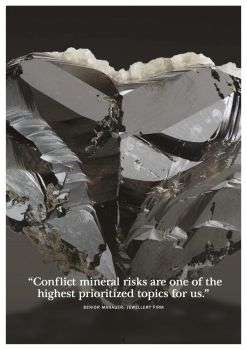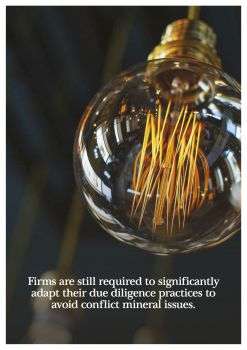Industry collaboration and consumer pressure are key to stopping the trade of 'conflict minerals', report finds

Responsible sourcing of raw minerals from conflict regions could be achieved if firms were to collaborate and if there was more pressure from consumers, a new University of Sussex report argues.
Research by Constantin Blome, Professor of Operations Management at the University of Sussex, has found that simple measures such as companies developing and sharing lists of certified smelter and refineries could make a big impact in the global drive to stop profits from mineral trade falling into the hands of armed groups.
The report comes as industry experts and policy makers gather in Paris this week (10-12 May 2016) for the world's largest conference on conflict minerals.
In the Eastern Democratic Republic of the Congo, various armed groups are profiting from the mining of the minerals tin, tantalum, tungsten (3Ts) and gold and using the revenue gained to continue to wage war, perpetrate violence and commit human rights abuses. Left unchallenged, this perpetuates instability and hinders economic and social development in conflict regions.
In 2010, international efforts to reduce trade in conflict resources led to the Dodd–Frank Wall Street Reform and Consumer Protection Act (US) and the OECD Due Diligence Guidance for Responsible Supply Chains of Minerals from Conflict-Affected and High-Risk Areas (global).

However, more than five years on, Professor Blome's research on 'Stopping conflict minerals with the OECD Guidance for responsible mineral supply chains: Status Quo in Europe' reveals not only that few firms are fully implementing the OECD Guidance, but why.
Certainly, cost is not an issue. The study found that while the cost of implementing the guidance is higher for small firms, the average cost is 0.0002% of annual sales. Moreover the research found that firms will benefit if they source minerals responsibly by enhancing their reputation, improving investor relationships and better risk management.
However, the greatest barrier to implementation centres on the need to develop reliable data regarding the conflict-free nature of minerals. The absence of standard certification schemes compounds this issue with auditing proving problematic due to lack of coordination along the supply chain as well as a lack of appropriate types of audit.
Furthermore, gaps in the framework are also counter-productive to the process of ensuring conflict-free supply chains. These include:

- lack of clarity over responsibility for resolving due diligence issues
- unclear terminology
- accountability loopholes
- the fact that the guidance is voluntary not mandatory
Professor Blome said: "One key solution is for firms to work together with others in the supply chain or industry, perhaps through industry associations. Industry collaboration would facilitate audits through the sharing of information, standardise certification schemes and enable traceability, as well as reduce costs for companies – particularly smaller companies who have a higher cost burden.
"Yet, it is equally important for consumers and customers to apply pressure on companies, through campaigns and purchase choices, for 'conflict-free products' as this will encourage companies to fully comply and improve transparency."
The study found that jewellery firms achieve the highest level of Due Diligence implementation. While this is perhaps due to less complex supply chains compared to other industries, these firms have been exposed to the 'blood diamonds' issue, and as a result have a heightened awareness of responsible sourcing of minerals, directly as a result of consumer pressure. The effect is greater at the consumer end of the supply chain but there is a trickle-down effect. Similarly, companies in the supply chain of firms that have to comply with the Dodd-Frank legislations also achieve a high level of implementation.
Ultimately, to make 'conflict-free' products, firms need to work together, and consumers need to levy their purchasing power to pressure the companies, to source responsibility. In this way the guidance would become mandatory in practice, without ever needing to be in legal terms.
The study is based on in-depth interviews with senior executives investigates the current status of the OECD Due Diligence implementation across European firms based on firm perception as well as the barriers and solutions to implementation across five industries: automotive, aerospace and defence, electronics and general manufacturing, jewellery, and smelting and refining. In a detailed report and short policy brief Prof Blome presents a set of clear recommendations for different firms based on size, industry and where they are in the supply chain that could improve implementation of Guidance and more responsible supply of minerals.
The most commonly mined conflict minerals from the DRC are cassiterite (for tin), wolframite (for tungsten), coltan (for tantalum), and gold ore.
Provided by University of Sussex


















